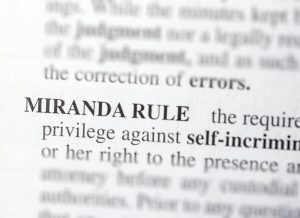Everybody has heard of Miranda rights, but few actually understand what they are and what they do. You may be surprised to learn that police officers do not always have to read you your Miranda rights when they are questioning or even arresting you? Sounds crazy, but it’s true.
The name “Miranda” came from the landmark United States Supreme Court case Miranda v. Arizona in 1966. The issue was whether police officers had to advise a person of his or her Constitutional rights before questioning them about a crime. What constitutional rights? The Fifth Amendment to the Constitution provides the constitutional right against self-incrimination. In other words, the government can’t make you tell them anything that may incriminate you. And the person must be told that he or she has the right to consult with an attorney to discuss the Fifth Amendment right. So, out of the Miranda case, came the Miranda rights or warnings that we all have become accustomed to when someone is arrested.

But Miranda rights only relate to custodial interrogation and the right against self incrimination. So, if you don’t incriminate yourself, no Miranda rights are required. And law enforcement must only advise you of your Miranda rights before interrogating you in a custodial setting. Whether a person is in custody depends on what a reasonable person in the person’s place would believe that they were in custody. So if officers don’t interrogate you or it’s not in a custodial setting, then they don’t have to read you your rights.
Now, whether you’re in a custodial setting and whether it is an interrogation is a factual question decided by a judge after your attorney files a motion to suppress the statements the government wants to use against you. Typically, there will be a hearing where the judge will hear testimony from the officer, testimony from the defendant if he or she so chooses to testify, a recording of the defendant’s statement, or any other testimony or evidence offered. Then, the judge will make factual findings and apply the law to those factual findings. There’s a whole lotta case law on when a person is in custody and when they are subject to interrogation that will guide the judge. Only if the judge finds that it was an interrogation, it was custodial and Miranda rights weren’t read to the defendant will the judge consider suppressing the statements.
So, what are those Miranda rights and warnings?
First – you have the right to remain silent. So, invoke that right. It cannot be used against you. This is a sacred Constitutional right in the Fifth Amendment. No person can be compelled in any criminal case to be a witness against himself. All you have to say is, respectfully officer, I’d like to remain silent. Then, the officer cannot ask you any further questions.
Second – If you do talk to the officer, anything you say can and will be used against you. So, even if you didn’t commit a crime, they can use your own words against you to establish some fact that helps their case against you. They can take your words out of context. They can lie to you. They can trick you. So, when they warn you that anything you say can and will be used against you, they’re not bluffing.
Third – You have the right to an attorney. They have no authority to question you without an attorney present, unless you consent. If you agree to talk to them and you agree to do it without a lawyer, then they can ask you as many questions as they want for as long as they want for as long as you don’t invoke your rights.
Fourth – If you can’t afford an attorney, one will be provided for you. This right was confirmed in the famous Supreme Court case Gideon v. Wainright. So, if law enforcement wants to question you about a crime, you have a right to an attorney whether you can afford one or not.
Fifth – If you decide to answer questions without an attorney, you can invoke your right to remain silent and/or your right to an attorney at any time. So, if you initially agree to talk to an officer, but that officer starts getting more and more confrontational or you are getting concerned about what the officer is asking, you can always invoke your rights at any time.

But again, the best course of action is to politely tell the officer that you would like to remain silent and would like to speak to an attorney. And then pick up the phone and call a lawyer.
But what if you initially invoked your rights, but then started talking to the officer again. Do they have to reread you your rights?
Recently, the Florida Supreme Court rolled back Miranda protections by overturning their own precedent. In State v. Penna, the Florida Supreme Court overruled its own Shelly decision and held that when a defendant invokes his or her Miranda rights, but then reinitiates the conversation with law enforcement, there is no per se rule that the officer must reread the Miranda warnings or even remind the person of those warnings.
Law enforcement officers know the law. Lawyers know the law. Most people questioned by law enforcement don’t know the law. And knowledge is power. If you are questioned by law enforcement, politely tell the officer you would like to remain silent and would like an attorney. Then pick up the phone and call a lawyer.
 About the author: Jeremy Lasnetski has been an attorney in the state of Florida for over 20 years. His knowledge of federal and state laws continues to grow daily with his passion for reading case law and updates to state statutes. He has represented clients in both State and Federal criminal courts since 2008, including trials and appeals. Before that, he was a state prosecutor between 2001 – 2008 prosecuting drug crimes, organized crime, homicides, and more. If you need a criminal defense attorney in Jacksonville, call Lasnetski Gihon Law at 904-642-3332.
About the author: Jeremy Lasnetski has been an attorney in the state of Florida for over 20 years. His knowledge of federal and state laws continues to grow daily with his passion for reading case law and updates to state statutes. He has represented clients in both State and Federal criminal courts since 2008, including trials and appeals. Before that, he was a state prosecutor between 2001 – 2008 prosecuting drug crimes, organized crime, homicides, and more. If you need a criminal defense attorney in Jacksonville, call Lasnetski Gihon Law at 904-642-3332.
 Jacksonville Criminal Lawyer Blog
Jacksonville Criminal Lawyer Blog

